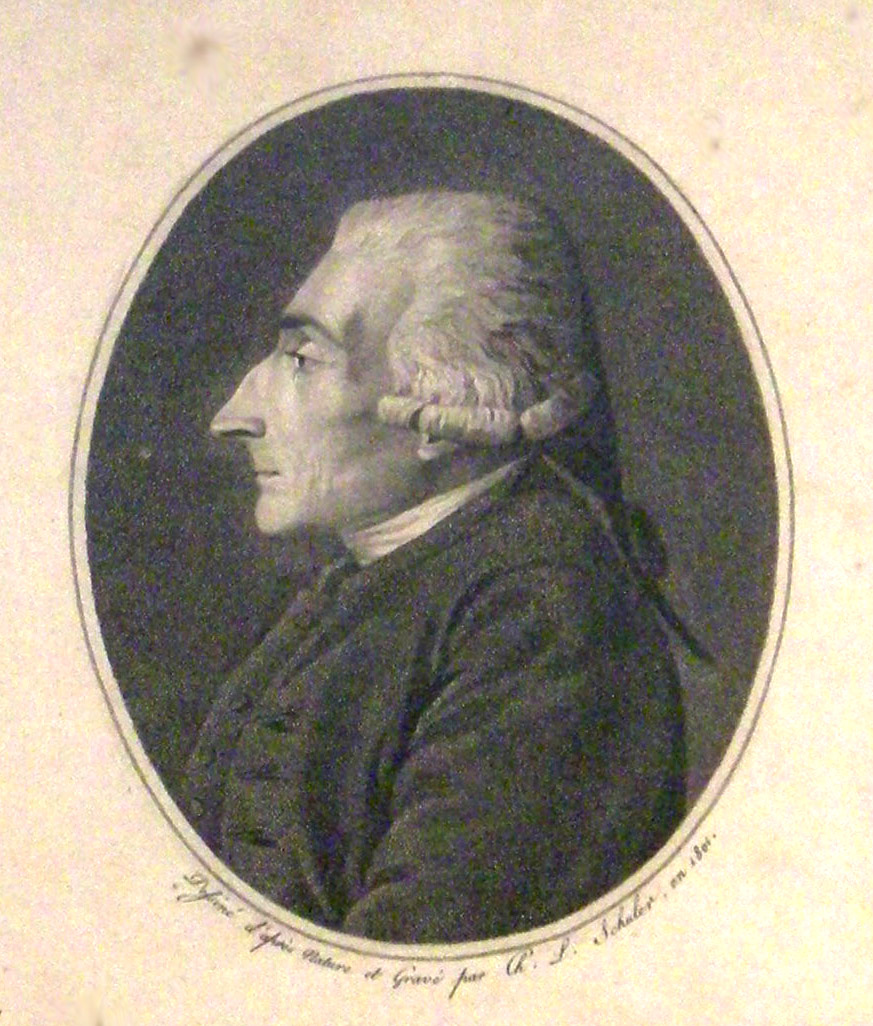Jérémie-Jacques Oberlin on:
[Wikipedia]
[Google]
[Amazon]
 Jérémie-Jacques Oberlin (8 August 1735 – 10 October 1806) was an Alsatian
Jérémie-Jacques Oberlin (8 August 1735 – 10 October 1806) was an Alsatian
 Jérémie-Jacques Oberlin (8 August 1735 – 10 October 1806) was an Alsatian
Jérémie-Jacques Oberlin (8 August 1735 – 10 October 1806) was an Alsatian philologist
Philology () is the study of language in oral and written historical sources; it is the intersection of textual criticism, literary criticism, history, and linguistics (with especially strong ties to etymology). Philology is also defined as th ...
and archaeologist
Archaeology or archeology is the scientific study of human activity through the recovery and analysis of material culture. The archaeological record consists of artifacts, architecture, biofacts or ecofacts, sites, and cultural landscap ...
. He was also known as Jeremias Jakob Oberlin in German
German(s) may refer to:
* Germany (of or related to)
** Germania (historical use)
* Germans, citizens of Germany, people of German ancestry, or native speakers of the German language
** For citizens of Germany, see also German nationality law
**Ge ...
.
The brother of Jean Frédéric Oberlin
J. F. Oberlin (31 August 1740 – 1 June 1826) was an Alsatian pastor and a philanthropist. He has been known as John Frederic(k) Oberlin in English, Jean-Frédéric Oberlin in French, and Johann Friedrich Oberlin in German.
Life
Oberlin was ...
, he was born at Strasbourg
Strasbourg (, , ; german: Straßburg ; gsw, label=Bas Rhin Alsatian, Strossburi , gsw, label=Haut Rhin Alsatian, Strossburig ) is the prefecture and largest city of the Grand Est region of eastern France and the official seat of the Eu ...
. While studying theology
Theology is the systematic study of the nature of the divine and, more broadly, of religious belief. It is taught as an academic discipline, typically in universities and seminaries. It occupies itself with the unique content of analyzing the ...
at the university he devoted special attention to Biblical archaeology
Biblical archaeology is an academic school and a subset of Biblical studies and Levantine archaeology. Biblical archaeology studies archaeological sites from the Ancient Near East and especially the Holy Land (also known as Palestine, Land o ...
. In 1755 he was chosen professor at the gymnasium of his native town, in 1763 librarian to the university, in 1770 professor of rhetoric
Rhetoric () is the art of persuasion, which along with grammar and logic (or dialectic), is one of the three ancient arts of discourse. Rhetoric aims to study the techniques writers or speakers utilize to inform, persuade, or motivate parti ...
, and in 1782 of logic
Logic is the study of correct reasoning. It includes both formal and informal logic. Formal logic is the science of deductively valid inferences or of logical truths. It is a formal science investigating how conclusions follow from premises ...
and metaphysics
Metaphysics is the branch of philosophy that studies the fundamental nature of reality, the first principles of being, identity and change, space and time, causality, necessity, and possibility. It includes questions about the nature of conscio ...
.
Oberlin published several manuals on archaeology and ancient geography
Geography (from Greek: , ''geographia''. Combination of Greek words ‘Geo’ (The Earth) and ‘Graphien’ (to describe), literally "earth description") is a field of science devoted to the study of the lands, features, inhabitants, and ...
, and made frequent excursions into different provinces of France
France (), officially the French Republic ( ), is a country primarily located in Western Europe. It also comprises of Overseas France, overseas regions and territories in the Americas and the Atlantic Ocean, Atlantic, Pacific Ocean, Pac ...
to investigate antiquarian remains and study provincial dialects, the result appearing in ''Essai sur le patois Lorrain Lorrain may refer to:
* Claude Lorrain (1600–82), a 17th-century French artist of the baroque style
* Lorrain language, a Romance dialect spoken in Lorraine region in France and Gaume region in Belgium
See also
* Lorain (disambiguation)
* Lor ...
'' (1775); ''Dissertations sur les Minnesinger
(; "love song") was a tradition of lyric- and song-writing in Germany and Austria that flourished in the Middle High German period. This period of medieval German literature began in the 12th century and continued into the 14th. People who wr ...
s'' (1782–1789); and ''Observations concernant le patois et les mœurs des gens de la campagne'' (1791). He also published several editions of Latin authors and copied manuscripts by Gottfried von Hagenau
Gottfried von Hagenau (also known as Götz von Hagenau, Gozzo de Hagenowe, Goetz de Haguenau, Godefridus Haguenonensis, and several other names) was a medieval priest, physician, theologian and poet from Alsace. As his name suggests, he was probab ...
, the originals of which are now lost.
Notes
References
* {{DEFAULTSORT:Oberlin, Jeremie-Jacques 1735 births 1806 deaths French archaeologists French philologists Members of the Académie des Inscriptions et Belles-Lettres